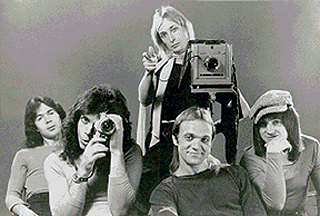

|
|
Canada's Sweeney Todd is the glam-like outfit that gave rise to the peculiar pop skills of electric dreamer Nick Gilder, a towering magical imp, and meat-and-potatoes professional Bryan Adams. Born in London, raised in Vancouver, Gilder joined Rasputin with high school friend and guitarist Jim McCulloch. The band evolved into Sweeney Todd, an obviously theatrical para-pomp 10cc-type-unit that quickly ensnared a local following. Producer Martin Shaer caught the act at a high school gymnasium and soon London Records signed and released Sweeney Todd in '75. Thanks to the delectable groupie-ode "Roxy Roller," written by Gilder and McCulloch, Sweeney Todd quickly ruled the Great White North. Chrysalis Records wooed Gilder and McCulloch to Los Angeles and the duo bolted, leaving Sweeney Todd without a creative impetus. Clark Perry took over the lead role and the band recorded a different rendering of 'Roxy Roller" before Perry was replaced by a sixteen-year-old Bryan Guy Adams who had pestered Shaer into an audition. Adams sang on yet another "Roxy Roller" and accepted a Juno on behalf of the Gilder version. Sweeney Todd's If Wishes Were Horses features the earliest Bryan Adams' songs, as well as holdovers from Gilder and McCulloch (including the excellent "Tantalize"). "Song for a Star" details Adams's attempts at mimicking the Bolan-like-brainiac Gilder: "Stepping in time with your pace, though we never yet met face to face." Gilder released a fourth rendition of "Roxy Roller" on his solo debut, You Know Who You Are. His second LP, the legendary City Nights, yielded the immortal one-hit-wonder "Hot Child in the City." Meanwhile, Adams fell out of favor with Sweeney Todd after exhaustive touring in support of If Wishes Were Horses, and split to return to high school. A year later in '78, Adams happened upon his soon-to-be songwriting partner, Prism's Jim Vallance, in a music store. The duo penned songs for a plethora of established stars until Adams reached solo superstar status in the mid 80's. Sweeney Todd labored on with new manager Ron Wright until '78. Gilder reformed the band in the late 90's. -Stone, CheapTrashNYC |